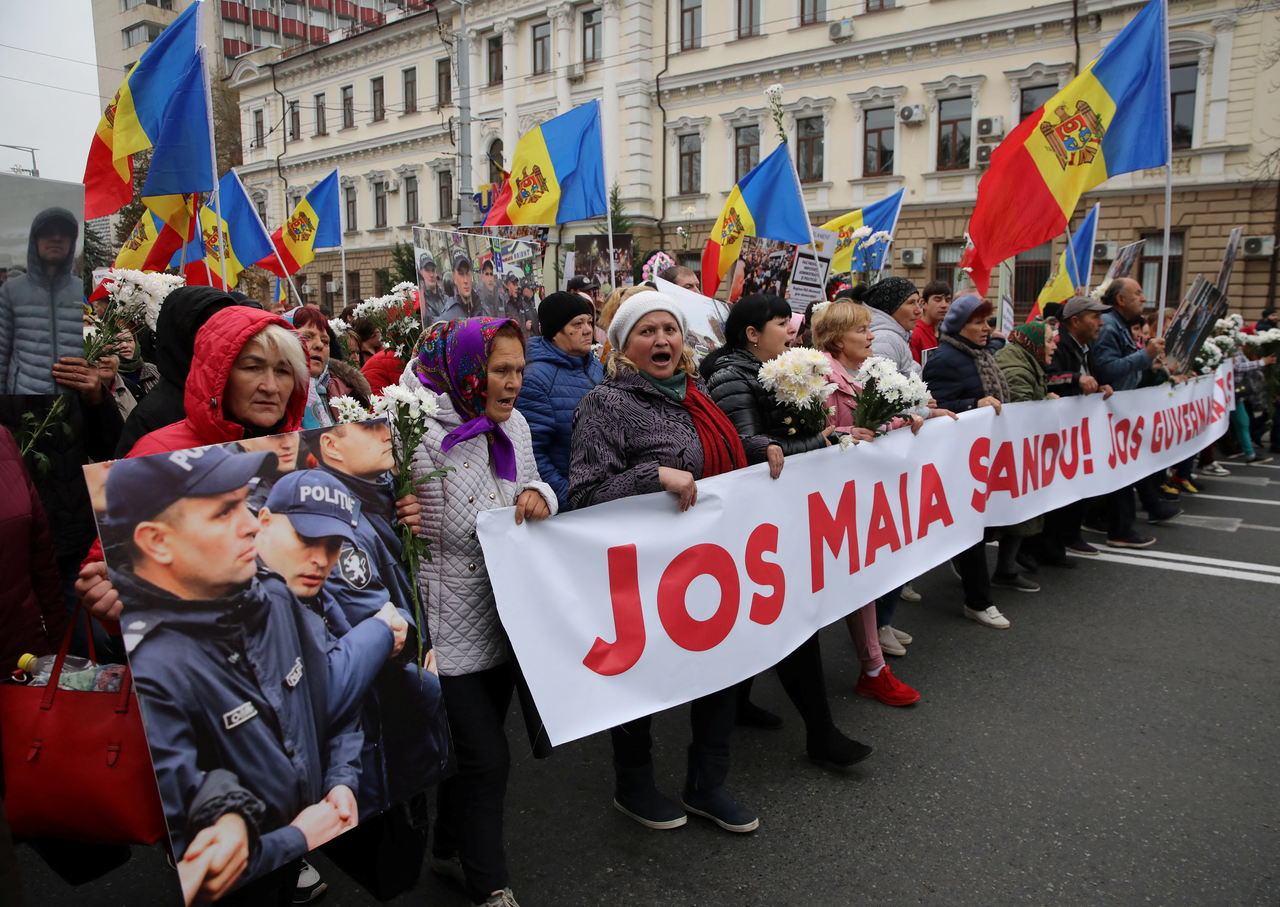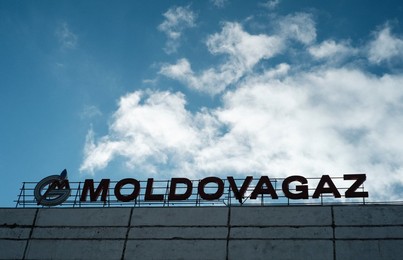Moldova Faces Down an Energy Crisis and Protests
Western support has helped Moldova through a deep energy crisis. The crisis, manufactured by Russia by limiting gas supplies in winter, violating a contract, is part of an attempt to persuade the Moldovan public to join protests organised by the pro-Russian Şor Party. It is in Poland’s interests to ensure further support from the European Union for Moldova, as it would align with Moldovans' determination for a pro-European transformation.
 VLADISLAV CULIOMZA / Reuters / Forum
VLADISLAV CULIOMZA / Reuters / Forum
Russia considers Moldova to be in its exclusive area of influence. It sees the takeover of full power in this country by the pro-European camp of Maia Sandu, who became president at the end of 2020, as a threat. In 2021, her Party of Action and Solidarity (PAS) won an independent majority of 63 deputies in the 101-seat parliament and appointed the government of Natalia Gavriliţa. It then launched reforms to eliminate structural corruption and the oligarchic system. Moldova took advantage of a change in the sceptical attitude of members of the European Union towards eastward enlargement after the Russian invasion of Ukraine in February 2022 and obtained candidate status, together with Ukraine, in June 2022. In the face of the Russian aggression, Moldova has maintained a friendly neutrality towards Ukraine. It has also made assertive gestures towards Russia, including expelling a diplomat after a rocket fell on the village of Naslavcea in October 2022. It suspended its work in the Commonwealth of Independent States, and Sandu refused to participate in the CIS summit in Saint Petersburg last December.
Russia’s Favourites in Moldova
Russia has been trying to rebuild its system of influence in the Moldovan political class. According to an investigation by The Washington Post, the new Russian favourite is Ilan Şor, a businessman who fled to Israel after being sentenced to seven and a half years in prison for organising the largest theft in Moldova’s history—a billion dollars from three banks in 2014. The U.S. and the UK imposed sanctions on him under their “Magnitsky” laws.
Şor presents himself as the people’s tribune. The Şor Party, which has five MPs, has been organizing anti-government demonstrations since last spring, with the largest so far in November 2022 in Chişinău, which gathered about 50,000 people. The protests are based on social dissatisfaction with rising prices—in 2022, inflation was 30%, and gas and electricity charges have increased several times. However, many of the participants were “rented” by the party for about €20 and brought by buses to the protests. The Ministry of Justice applied in November 2022 to the Constitutional Court to examine the legality and possible liquidation of the Şor Party as a threat to the rule of law and the sovereignty of the state. Marina Tauber, who runs the party on behalf of Şor, is accused of illegally funding it and falsifying financial statements. Four TV stations associated with Şor have had their licenses suspended over the spread of Russian propaganda about the war in Ukraine.
Until recently, the main representative of Russian interests in Moldova had been former President Igor Dodon. Informally, he still leads the Party of Socialists, which until 2021 was the largest party in parliament. He accuses Sandu and PAS of drawing Moldova into the war by deliberately antagonising Russia. Meanwhile, the prosecutor’s office accuses Dodon of corruption and high treason, but that has not hindered his political activity. To maintain his loyalty, Russia provides him with the highly paid position of chairman of the Moldovan-Russian Business Union. However, it probably considers him an unpromising partner because, despite the Russian support, he did not win re-election, losing to Sandu, and the Socialists won just 32 seats in 2021, five fewer than in the previous elections despite an electoral bloc (BECS) with the Party of Communists. Russia is particularly concerned that Sandu and PAS won votes among many Russian-speaking voters, who were convinced by the postulates of radical anti-corruption reforms.
Energy Crisis
Triggering an energy crisis in Moldova in the winter is Russia trying to provoke mass participation in Şor’s protests. Gazprom, which usually supplies Moldova with all the gas it needs, has reduced supplies to 5.7 million m3 (mcm) of fuel per day since October, unjustifiably accusing the Ukrainian operator of refusing to transit larger quantities. Meanwhile, the five-year contract from 2021 obliges Gazprom to deliver 8.1 mcm in October, 9.8 mcm in November, and 13.1 mcm per day in December. Russia has also threatened to stop the supplies altogether, alleging that Ukraine is stealing gas in transit and that Moldova violated the contract by directing some quantities to Ukrainian storage facilities. In response, the Gavriliţa government has not ruled out applying to an arbitration court for compensation from Gazprom.
By limiting gas supplies, Russia also aimed to cause blackouts across Moldova. Since October, when Ukraine stopped exporting electricity, 80% of the Moldovan needs were covered by the Kuchurgan gas-fired power plant from Transnistria. Since November, though, it has suspended electricity deliveries due to a dispute with the central authorities over the division of the reduced gas volume. Before the crisis, Transnistria received about two-thirds of the fuel contracted by Moldova. It was a form of a Russian subsidy because Gazprom did not demand payment from the region, but only booked it as debt, which amounts to about $9 billion. This gas is mainly used by the steelworks and the cement mill in Rybnitsa, which are the main sources of income for the “Sheriff” concern, an oligarchic and mafia system that de facto rules Transnistria.
The Moldovan authorities, thanks to an agreement with Transnistria in early December, averted the danger of blackout. In exchange for all the delivered Russian gas—formally the region is to pay Gazprom for it—Kuchurgan resumed electricity supplies at the price of $73 per MWh. The EU, the U.S., and Ukraine took this as stabilisation of the situation, and since December, distributors have started to lower energy rates in Moldova. It will cover its gas needs of 3.7 mcm per day from reserves stored abroad—according to the authorities, these reserves amount to 250 mcm—and small purchases from the EU.
Western support has helped Moldova survive the peak of the crisis and maintain its pro-European orientation. According to iDATA polls from the beginning and end of 2022, PAS can still count on around 25% of the vote, although support for BECS has increased from 20% to 24%, and for Şor’s Party from 11% to 12%. The EU allocated €385 million, the EBRD €300 million, Germany €40 million, and the U.S. $47 million to co-finance purchases covering the energy deficit and for discounts for the population. During the period when Kuchurgan was withholding deliveries, Romania provided Moldova with up to 90% of its electricity. Romania also changed its law to sell energy preferentially at €93 per MWh, but due to a drought, Romanian hydropower plants were only able to generate small amounts. Therefore, most of the electricity Moldova bought was on the open exchange for €100 to 350/MWh. Romania also supplied firewood and mazut to keep the gas-based Moldovan CHP plants operating. EU partners allowed for priority gas supplies to Moldova, including, for the first time, reverse flow on the Trans-Balkan Gas Pipeline, which had not been used since Russia ended its transit through Ukraine to the Balkans.
Conclusions
Russia should not be expected to abandon further attempts to destabilise Moldova. The efforts of President Sandu’s camp to liquidate corruption and the oligarchic system are a threat to its influence. At the same time, the majority of Moldovan residents remain passive or distrustful of Şor, who is organising protests against an energy crisis caused by Russia. While it is unlikely that the Gavriliţa government will fall or early elections called as a result of the protests, they may slow the pro-European transformations and distract the attention of the EU and the U.S. from supporting and defending Ukraine.
Russia’s energy pressure has turned out to be counterproductive. The limitation of supplies did not prompt the Moldovan authorities to make concessions, but instead to search for alternative sources of gas and electricity. This confirms their belief in the correctness of actions towards diversification, such as decisions to store gas abroad or synchronise the Moldovan electricity grid with the EU. The crisis also has encouraged them to accelerate investments integrating Moldova’s energy sector with the EU’s and implement the postponed Third Energy Package, which would help Moldova to become energy independent from Russia.
The energy crisis will be a test of the EU’s credibility in the eyes of Moldovan society and will determine its insistence on further pro-European changes. Resistance to Russian energy pressure is very costly for Moldova’s budget, and without further support, it will not be able to finance energy purchases and relief for the population. Therefore, it is in the interests of Poland, which consistently promotes the enlargement of the community to the east, to strive to maintain significant EU support for Moldova, not only in terms of structural changes but also in the field of ad hoc financial assistance.





